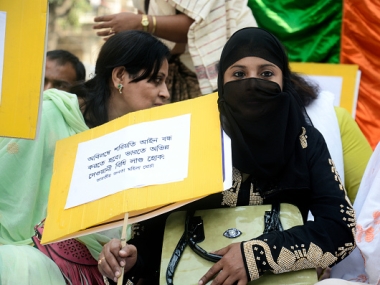The concept of triple talaq has divided opinions around the country. The matter has made its way to the Supreme Court which heard the arguments for six days and reserved its verdict. The judgment is expected to come out in July.
In the midst of it all, India’s secular nature was debated heavily. Questions from what a secular nation would do to whether we actually are secular at all were discussed throughout the country. An obvious point of comparison is then to other countries and how they deal with the situation. And this is where India fares poorly as even Pakistan has a more progressive law in place.
News18 has quoted former Chief Justice of Pakistan Justice Jawwad S Khawaja as saying that “triple talaq was never a part of pure Islamic history and was not considered valid as per Islamic law.” He further added that, “Instant talaq or triple talaq has not been considered valid in Islam and it is not considered to be the best form of divorce under Islamic law. If you look at what jurists have opined in the 1,000-year old history that it was never acceptable and it has never been the most accepted of talaq in any era of Islamic history,”
The report further goes into the details on the Pakistani law on divorce and points out a three month cooling-off period built into the process.
Justice Khawaja also said that “Even traditional Islamic jurists had never considered or accepted the practice of instant triple talaq as a part of the pure Islamic law. In Pakistan we have a statutory enactment and the statute was based on what the Islamic jurists had spoken of and who had stated that this gap of three months was the best and also served as a cooling-off period between the couple.”
Muslim law in India comes from The Muslim Personal Law (Shariat) Application Act, 1937 which says that in so far as matters concerning marriage, divorce, inheritance and other personal matters, the law governing Muslims in India shall be the Muslim personal law or the Shariat.
Under Shariat, as applied to India, only a man can initiate divorce — under the Dissolution of Muslim Marriages Act, 1937 a woman may also initiate the divorce — the only difference being that under the former, the husband does not need to show cause, while under the latter, the wife must show cause.
The present case has been filed by Shayara Bano. After being married for 15 years, Bano’s husband gave her triple talaq in October 2015. She approached the Supreme Court in 2016, challenging the validity of arbitrary practices against women followed by Muslims. Her petition asks the Supreme Court to declare talaq-e-bidat, polygamy and nikah halala illegal and unconstitutional on the grounds that they violate the rights guaranteed by the Constitution under Articles 14, 15, 21 and 25.
The case was heard by a five-member bench of the Supreme Court. The bench was a unique one as it comprised judges belonging to five different religions .
During the hearing, the All India Muslim Personal Law Board (AIMPLB) told the Supreme Court that it would issue an advisory to qazis to tell bridegrooms that they will not resort to triple talaq to annul their marriage. This move was called a “mere eyewash” by Attorney General Mukul Rohatgi who said it was an attempt to gain “legal sanctity among the community”.
After the Supreme Court reserved its verdict, union minister M Venkaiah Naidu said that the NDA government was ready to bring a law to stop the triple talaq in the Muslim community, if necessary. “Our government has made its stand very clear on triple talaq. If necessary, it will bring a legislation against it.. after allowing the community to reach a consensus through deliberations,” Naidu has said.
Zakia Soman and Noorjehan Niaz while writing for Firstpost had argued that the abolition of triple talaq is long overdue in independent India. They called it a unilateral and arbitrary practice which results in women being thrown out of homes and rendered destitute in an instant. The women in this case are seeking justice which they are entitled to as citizens in a democracy as they knock at the doors of the courts and the parliament.


)




)
)
)
)
)
)
)
)